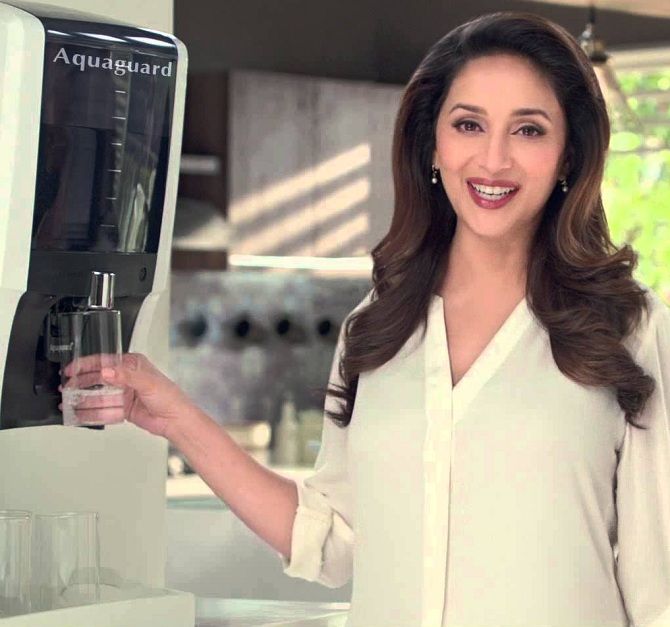The company behind brands like Aquaguard focuses on technology to differentiate brand, rethinks communication strategy. Arundhuti Dasgupta reports.

The oldest water purifier brand is gearing up to protect its legacy and market share.
Marzin Shroff, chief executive officer of the Shapoorji Pallonji group-owned Eureka Forbes, says the company is engaging closely with the brand as customers change and competition grows in the market place. "The face of the customer is changing and we need to ask: What are they really looking at?" he says.
The company has spent over ₹100 crore on the brand; on technological upgrades, on the complete product offering, on service and communication.
Shroff says that there are three defining elements of the brand: technology, product and service. The expectation is that a combination of the three will help differentiate Aquaguard, Eureka Forbes' flagship brand, which accounted for 70 per cent of the turnover of ₹3,041 crore for the year ended March 2017.
Eureka Forbes started out as a direct sales company in 1992 and launched its retail business 13 years ago.
Over the years, it has seen its near-monopoly status disrupted by a growing number of multinational and home grown labels.
With over a dozen major brands in the market, to stay relevant and fight off the challengers, an overhaul has become imperative.
Leverage the trust
Shroff believes Aquaguard's biggest asset is customer trust.
"If you look at our trust score, it is 1.8 times the second largest brand in the market, and we have a brand recall that Coke and Pepsi would be envious of," says Shroff, quoting internal studies and surveys by external agencies.
The brand is the market leader (67 per cent market share according to the last survey the company commissioned), and "We enter a kitchen every one second somewhere in the country," says Shroff.
It has 15 million customers in 1,500 cities and towns.
The challenge is to ensure that trust and loyalty scores do not dip now that customers have more choice.
Also the company needs to get new customers to connect with the brand.
"The brand has to leverage the trust, but do a differentiated strategy," Shroff says.
And that is where the 'water-plus' positioning comes into play. "Pure, safe is the generic value [of the brand], and then we add levels around it. Temperature, flavour, minerals, we have to keep reinventing ourselves," Shroff adds.
Service expectations
The challenge today is keeping the core service promise despite changing customer expectations.
The brand is still associated with the Eurochamp say experts, the sales person who hawked the product door-to-door when the company first set up shop. However, the message is getting diluted because of a range of reasons they say.
Shroff says that service and the service professional is integral to the brand. The company has over 18,000 retail outlets, 1,800 service centres and over 5,000-strong direct sales network. Even today the majority of our products sell directly he says.
But the customer's expectation over service today is very different. The home that used to be open 24x7 is hardly open for a few hours in the week.
Shroff explains, "Our technicians do not live in town; they also need to go home. So, the challenge is to meet customer expectations and be a humane employer at the same time."
The company is tapping into technology to untangle the customer-service relationship.
"The backend technology is being geared up to help technicians deliver more efficiently. Almost 7-8 per cent of the turnover goes into developing robust IT solutions so that the brand's service proposition is not diluted," says Shashank Sinha, associate vice-president, marketing of Eureka Forbes.
Get the tech edge
The company says it spends close to 3-4 per cent of the turnover on research and development of new technology. Its latest technological breakthrough is called Biotron.
"Biotron declusters the water molecule that lets the cells in the body absorb the nutrients in water faster," says Shroff.
It provides innumerable benefits to the customer and Shroff aDDS, "We have applied for a global patent, and only after we were convinced about its effects that we have announced it."
Biotron is the differentiated value proposition that gave rise to the concept of the #farakdikhtahai (the difference is visible) campaign Sinha says.
He adds that the company has also developed a range of water-saving technologies although it has not really spoken about these in the past. Several global alliances have also been struck to provide cheap, clean water to people in small towns and remote regions.
Reach out to the young
Eureka Forbes has traditionally been a media-shy company, both Shroff and Sinha say. But they see the need to change. It is important for the brand to be seen and heard more often today, they say.
The company is also trying to build a younger brand, says Shroff.
To reach out to millennial customers, the brand is pushing itself into youth festivals and concerts. Its campaigns drive home the trust legacy of the brand, while spelling out the difference with respect to other brands in the market.
Communication had to change as clean water moved from being a push to a pull product, says Sinha. Earlier the brand had tagged itself as a 'pani ka doctor' (water doctor). Knowledge gave the brand its expert positioning, but now everyone is on the same plank, says Sinha.
The company has for the first time used a celebrity endorser in actress Madhuri Dixit for its new campaign. Many question this, saying that it ends up looking like rival Kent that has Hema Malini as its ambassador, instead of being different.
Sinha says that changing customers call for changing strategy.
"Also Madhuri is the Unicef ambassador for children and embodies the values of the brand."











